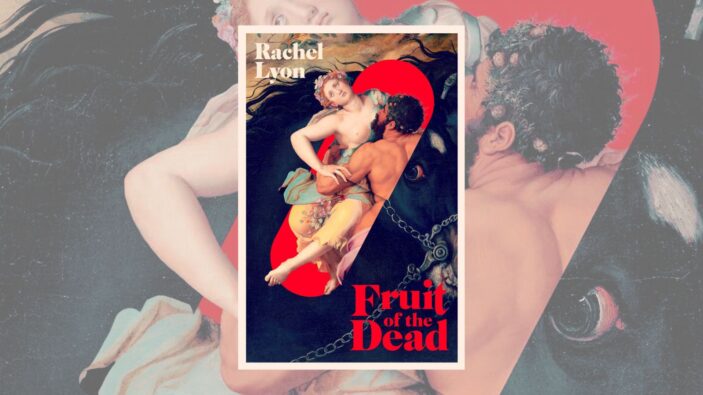
Readers should be advised that this book contains themes of sexual assault.
Inspired by the Ancient Greek myth of Persephone and Demeter, Rachel Lyon’s sophomore novel Fruit of the Dead is an inventive tale that explores mother-daughter tensions, power plays and addiction amidst the backdrop of a billionaire’s private island.
If you haven’t brushed up on your Greek mythology since high school, I’ll recap: a young Persephone picks a narcissus flower and is abducted by Hades, the god of the underworld. Demeter, her mother, searches for her on Earth in a furious rage. Meanwhile, Hades tricks Persephone into eating a pomegranate seed, which binds her to spend one-third of each year with him and the rest with Demeter in Olympus.
Lyon’s updated retelling follows 18-year-old Cory, a camp counsellor who has just finished high school and has no plans for her future. Uninspired and untethered, she finds herself taking up an exclusive offer from Rolo Picazo, the charismatic CEO of a pharmaceutical company and one of her camper’s parents, to nanny his children on his private island.
Not wanting to return to the real world or deal with her fraught relationship with her mother, Cory accepts – ignoring the ridiculous amount of red flags Rolo is waving in her face. Surrounded by luxury and with an endless supply of opiates at her disposal, Cory begins to stumble into uncharted territory – where the lines are as blurred as her vision.
Meanwhile, Cory’s mother Emer has become increasingly alarmed by her daughter’s abrupt disappearance. Amid her own career crisis, Emer embarks on a maddening search to find Cory. The novel alternates between the two women’s perspectives, reimagining the myth’s themes of love, control, and indulgence.
Fruit of the Dead is an easy and appealing read. It’s hard not to revel in the world of lavish parties, unlimited narcotics, and opulent mansions. From the moment we meet Rolo, a greedy and seedy man of indulgence, the atmosphere is unsettling, with danger feeling only one misstep away. All the while, Lyon’s poetic prose evokes a visceral feeling that all is not what it seems.
Retaining the myth’s themes of power, coercion, and desire, Lyon refocuses the lens to explore modern issues, such as teenage petulance and Big Pharma. Those familiar with the tale of Persephone and Demeter will be thankful that Fruit of the Dead deviates from the originals ending. However, the conclusion we get does feel a little lack-lustre.
Many of the book’s more intriguing themes are never fully realised, with an abrupt ending devoid of the deep emotion it perhaps should have garnered. We never learn enough about Cory to become invested in her journey or to really make sense of it. As a stand in for Persephone, she does accurately embody the chaos of girlhood and standing on the precipice of the rest of your life. She can be forgiven for some of her naïve impulsivity, but it was frustrating to watch her continually make bad decisions that often didn’t feel justified.
Emer’s perspective did help to inform Cory’s story, but her own world was much harder to engage with. Grappling with a professional fall from grace (her NGO is exposed to be self-serving rather than supportive of the communities it claims to aid) Emer is headstrong and defiant. That is until her worry for Cory burgeons into her own unravelling. It’s an interesting take on a mother’s love, and the unspoken connection between parent and child.
While the plot lacks the depth required to truly tackle its themes of drug addition, coercion and sexual assault, it does capture the messy, ongoing complexities of a mother-daughter relationship. Through alternating perspectives, we learn of each women’s traumas – particularly how Emer’s own challenging upbringing influences how she parents Cory. Hell hath no fury like a mother scorned.
Lyon has done well to make an ancient myth resonate with a modern audience. At times Fruit of the Dead feels like a fever dream… but maybe that’s the whole point.
![]()
![]()
![]()
![]()
![]()
THREE STARS (OUT OF FIVE)
Fruit of the Dead by Rachel Lyon is available now from Scribner. Grab yourself a copy from a local bookshop HERE.
